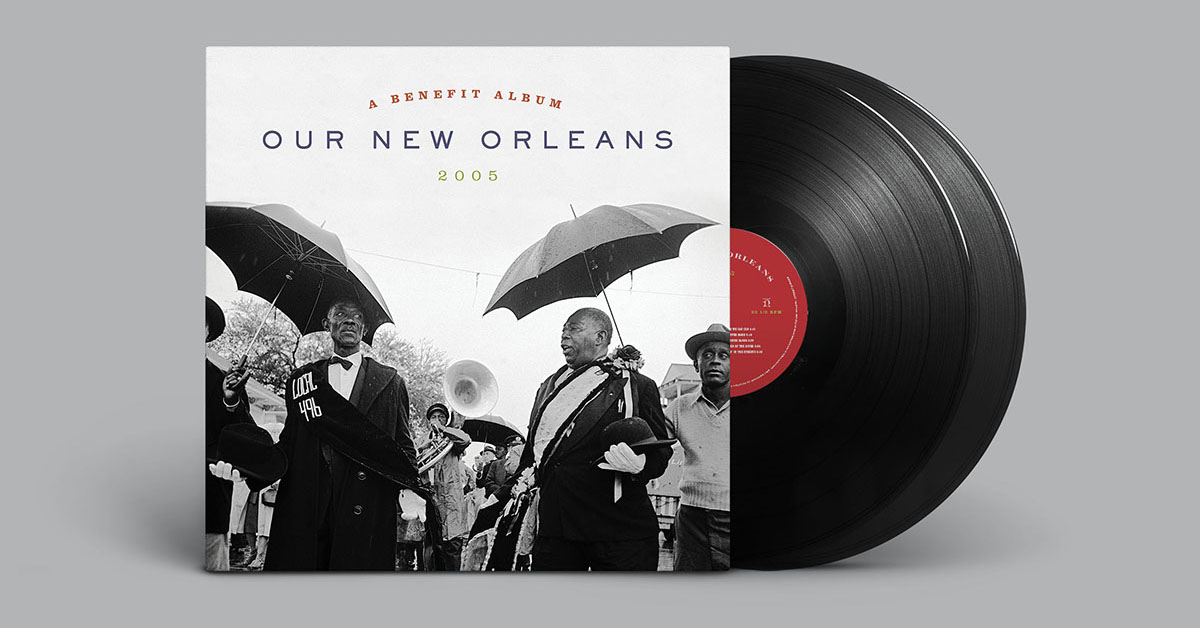A remastered, expanded edition of the 2005 benefit album Our New Orleans is available for the first time on vinyl and digitally now. The new version includes five previously unreleased tracks by Davell Crawford, Buckwheat Zydeco and Ry Cooder, Dr. Michael White, Dr. John, and The Wardell Quezergue Orchestra featuring Donald Harrison. To date, $1.5 million has been raised from the 2005 release to benefit the New Orleans Habitat Musicians’ Village.
A remastered, expanded edition of the 2005 record Our New Orleans is available for the first time on vinyl and digitally here via Nonesuch Records. The new version includes five previously unreleased tracks: “Do You Know What It Means,” by Davell Crawford; “Let's Work Together,” by Buckwheat Zydeco and Ry Cooder; “Crescent City Serenade,” by Dr. Michael White; “Walking By the River,” by Dr. John; and “Do You Know What It Means,” by The Wardell Quezergue Orchestra featuring Donald Harrison. You can watch a short video about it here:
The $1.5 million raised from the 2005 release went toward providing housing in partnership with low-income musicians and others through the New Orleans Habitat Musicians’ Village, a concept that was developed by New Orleans Area Habitat for Humanity, working with Branford Marsalis and Harry Connick, Jr. Habitat-built homes in the village now provide musicians and others of modest means the opportunity to buy decent, affordable housing. The centerpiece of the village is the Ellis Marsalis Center for Music, dedicated to celebrating the music and musicians of New Orleans and to the education and development of homeowners and others who live nearby.
A video of the late Dr. John recording “Walking by the River” in a New York City studio, during September 2005, can be seen here:
For Our New Orleans, many of the Crescent City’s best-known musicians recorded songs that are integral to their lives and that express their feelings about the city and the trauma of Katrina. The album was made swiftly and simply, over the course of a month, in one-day sessions across the country. Nick Spitzer, host of public radio’s New Orleans–based American Routes, contributed liner notes to the record, as did Pulitzer Prize–winning author Richard Ford, also a Crescent City resident. Other producers who made enormous contributions include Mark Bingham, Ry Cooder, Joel and Adam Dorn, Steve Epstein, Joe Henry, Doug Petty, Matt Sakakeeny, and Hal Willner.
Nonesuch’s parent company—Warner Records, part of the Warner Music Group—donated all production costs for Our New Orleans as part of the Group’s larger efforts on behalf of hurricane victims on the Gulf Coast. Many others involved in creating the album also generously donated their time and services.
Nonesuch President David Bither recalls, “What was most remarkable to me was the immediate response of the musicians. Many were in New Orleans when Katrina struck. Many lost everything they owned including even the musical instruments that are their livelihood. Yet they responded within days to the question of whether they might participate in this project. The emotion and the power of Our New Orleans come both from their anguish and from their incredible generosity.”
And the label’s Chairman Emeritus Bob Hurwitz said, “When we pick up a CD booklet, we usually skip over the page that says, ‘Special thanks to…’, but in the case of Our New Orleans, it is, after the listing of the musician’s names, the most important part of this package. Everyone wanted to help—studios that insisted on contributing free time, caterers, photographers and videographers, instrument rentals, producers, engineers—every step down the line, people gave, not only their profits, but absorbed all of their costs. It was an incredible outpouring of generosity.”
“Our New Orleans is a testament to the power of music to heal and provide a sense of community,” said Marguerite Oestreicher, Executive Director of New Orleans Area Habitat for Humanity. “Musicians helped the city heal after Hurricane Katrina, and Musicians’ Village helped them come home. We’re grateful to Nonesuch and everyone who worked on this album. This year has brought new challenges to everyone, but especially to our culture-bearers. This re-release could not be more timely.”
- Log in to post comments



